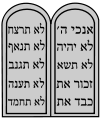Kavanah
| Part of a series on |
| Judaism |
|---|
   |
|
Other religions
|
|
Related topics |
|
Kavanah or kavana (also pronounced /kaˈvonə/ by some Ashkenazi Jews) (כַּוָּנָה; in Biblical Hebrew kawwānā), plural kavanot or kavanos, (Intention[1] or "direction of the heart[2]") is the mindset often described as necessary for Jewish rituals (mitzvot).[3]
Once the subject of great debate among medieval commentators, traditional Jewish sources now accept that fulfilling mitzvot without at least minimal kavanah is insufficient.[4]
Different Jewish authorities see various levels of kavanah required for various rituals, and especially for prayer. Some prayerbooks (siddurim) list kavanot for particular prayers. Some particular kavanot are associated with particular holidays, for example Sukkot, Pesach, Shavuot,[5] and others.
Kavanah in prayer may require understanding of the words of prayer, and not merely reciting the sounds.[6] Some perceive this as especially difficult to achieve for many Jews today when they pray using liturgical Hebrew, which many Jews outside of Israel do not understand.[7]
Some kavanot are particular to the tradition of Kabbalah, as a meditation,[8] or in Hasidic Judaism. In Kabbalah, Kavanah often refers to the permutations of the divine name that aim at overcoming the separation of the forces in the Upper World.[9]
In Chovot HaLevavot
Chovot HaLevavot (Duties of the Heart) by Rabbi Bachya ben Joseph ibn Paquda (section 8, chapter 3), gives 3 general categories for kavanah under the rubric "the different ways of serving God":
- duties of the heart alone ( which is the subject of his book) To be humble and reverence respect to God and to Love God with all your heart,all your soul and all your strength (To love God with sincere and honesty) and keep your heart,your mind your thought to regard humility,reverence respect,to have good wills,lovingkindness,morality & virtues towards God and towards another,:
- duties of the body and heart together, such as prayer, Torah study, praising and glorifying God, teaching wisdom, enjoining right conduct, warning against evil, and the like;
- duties of the limbs alone, in which the heart has no part except for initially directing the act to God, for example sukkah, lulav, tzitzis, mezuzah, observing Shabbos and the festivals, giving charity, and similar duties in which distraction by other thoughts does not harm the one who performs them.
See also
External links
References
- ↑ "Glossary of Kabbalah and Chassidut: K". Inner.org. Retrieved 2009-08-17.
- ↑ Babli, Berakhot 31a (Gemara) in Norman Solomon, ed. (2009). "First Tractate Berakhot (Blessings)". The Talmud: A Selection. Penguin. p. 23. ISBN 978-0-14-144178-8.
- ↑ Eisenberg, Joice; Ellen Scolnic; Jewish Publication Society (2001). The JPS dictionary of Jewish words. Jewish Publication Society. p. 79. ISBN 0-8276-0723-7.
- ↑ Shulchan Aruch 60:6 and 589:8
- ↑ Barenblat, Rachel (2005-07-13). "Kavanot for Shavuot". Ritualwell.org. Retrieved 2009-08-17.
- ↑ Summit, Rabbi Jeffrey (September 16, 2004). "Intention (Kavanah) and Time". Rabbi's Corner. Tufts Hillel. Retrieved 2009-08-17.
- ↑ Sutnick, Barbara and Reuven (1999). "THE PRAYER BOOK: A WINDOW ON JEWISH THEOLOGY". Jewish University in Cyberspace (J.U.I.C.E.). Retrieved 2009-08-17.
- ↑ Kaplan, Aryeh (1985). "3. Kavanot". Meditation and Kabbalah. Red Wheel. p. 214. ISBN 0-87728-616-7. Retrieved 2009-08-17.
- ↑ Buber, Martin (1974). Tales of the Hasidim - The Later Masters (7th ed.). New York: Shocken Books. p. 332. ISBN 0-8052-0002-9.